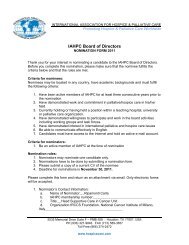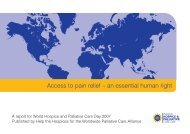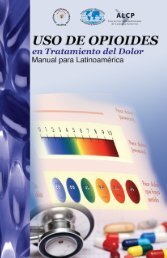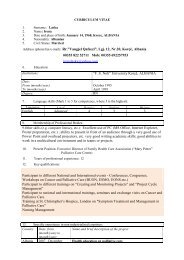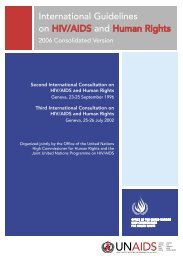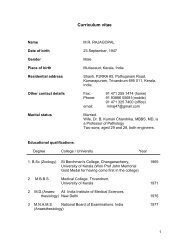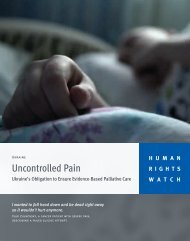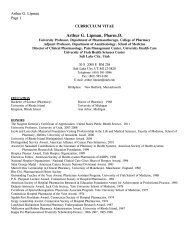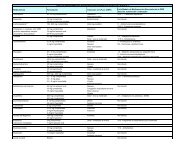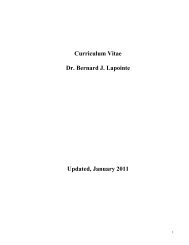Download Here - International Association for Hospice & Palliative ...
Download Here - International Association for Hospice & Palliative ...
Download Here - International Association for Hospice & Palliative ...
Create successful ePaper yourself
Turn your PDF publications into a flip-book with our unique Google optimized e-Paper software.
Professor Lukas Radbruch is the chair of palliative medicine at the University of Bonn, in the Western part of Germany. He<br />
was the first chair of palliative medicine at the RWTH Aachen University in Aachen from 2003-2010. Professor Radbruch<br />
attended medical school in Bonn, Germany, specialized in anaesthesiology and completed his habilitation (the German<br />
equivalent of a PhD) in 2000 in Cologne.<br />
His main research interests include symptom assessment, opioid treatment, fatigue, cachexia and ethical issues in palliative<br />
care. Professor Radbruch is involved in European palliative care research collaboratives and coordinates the project<br />
Access To Opioid Medication in Europe, which is funded by the Seventh Framework Programme of the European<br />
Commission.<br />
He is president of the European <strong>Association</strong> <strong>for</strong> <strong>Palliative</strong> Care (EAPC), a board member of the Worldwide <strong>Palliative</strong> Care<br />
Alliance and a member of the Drug Commission of the German Medical Board, the EAPC Research Network Steering<br />
Committee and the Expert Commission of the German Narcotic Control Agency. He also is editor of Der Schmerz.<br />
------- ------- ------- -------<br />
Regional Reports<br />
A Journey with Chivantarak — a Travelling <strong>Hospice</strong> Foundation in Thailand —<br />
<strong>Hospice</strong> work and Ancient practices<br />
We wake up in the middle of the night. The monsoon rains flooded the land during the day and some of the roads had<br />
turned into rivers. The traffic is bogged down in one meter of water, but this doesn’t frighten the Thai bus driver or the<br />
twelve experienced voluntary workers of Chivantarak. This night the bus is travelling 700 km north… to the province of Roi<br />
Ed where we will first visit a Buddhist monastery that provides AIDS sufferers with accommodation, medical treatment and<br />
spiritual care.<br />
At the beginning of the journey, Dr Mano, President of the <strong>Hospice</strong> Foundation of Thailand, laughingly said, "It is only two<br />
days, but we will all be exhausted afterwards”. He is a man who is very familiar with the vulnerability of life and the great<br />
authority of death since his early childhood.…[He] himself is a trained medical doctor who spent half of his life as a<br />
Buddhist monk and scholar until he set aside his robe to offer his knowledge and skills to the social development of his<br />
country and to those in need.<br />
There is little talk, everybody prepares themselves <strong>for</strong> their meeting with seriously ill patients. I am told "The secret of a<br />
good hospice carer is that she is a master in self-care." Chainat, a pharmacologist and deputy secretary of the foundation,<br />
suddenly tunes up his mouth organ and we all join in song….<br />
After an extensive ceremony in the monastery…we take paths that lead…to a modest wooden building in an idyllic setting.<br />
Approximately 25 people live here…. Maybe they don’t expect good news because AIDS patients in Thailand are<br />
occasionally excluded from society, but they can feel safe here. Today is different, they will meet a group that has<br />
managed to win their trust. Chainat deliberately sits amongst the people as Dr Mano begins to speak. He tells an<br />
allegorical story of confidence and hope and talks empathetically about the overwhelming, yet conquerable, feeling of being<br />
a victim. They are guided by his mellifluous voice as he delivers a meditation of deep religious significance which leads<br />
them into their bodies. White light is imagined to slowly float through their nostrils into the middle of their body to become<br />
embedded like a second soul-body. This enables the experienced person to transcend suffering and pain – even while<br />
passing towards, through, death. The government fosters this special technique of meditation as a <strong>for</strong>m of alternative<br />
medicine….<br />
The Chivantarak group is full of cheer. They have come here to infuse sufferers with a sense, and spirit, of joy – a means<br />
of preventing them from deteriorating into isolation. Pure joy fills the whole room along with music and dance….<br />
The next day we arrive at Roi-Ed-Hospital which is dedicated to treating cancer patients. I experience another impressive<br />
program offered to patients and staff that to a large extent consists of a mix of traditional religious and cultural practices.<br />
4 of 9



